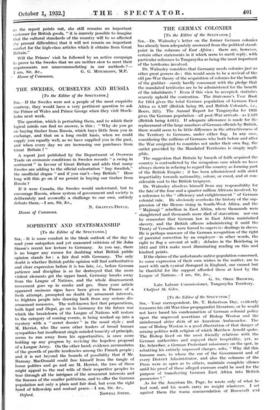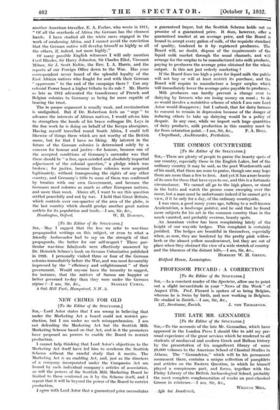[To the Editor of the SPECTATOR.]
Sul, —Your correspondent, Dr. T. Robertson Day, evidently treasures his Old War-time propagandist literature, or he would not have based his condemnation of German colonial policy upon the unproVed assertions of Bishop Weston and the Uninformed Wider dicta of an American Ambassador. The case of Bishop Weston is a good illustration of that danger of mixing politics with religion of which Matthew Arnold spoke. The Bishop lived on the most friendly relations with the German authorities and enjoyed their hospitality, yet, as Dr. Schreiber, a German Protestant missionary on the spot, in rebutting.his entirely unproved charges, asks, " Why did this humane man, to whom the ear of the Government and of every District Administrator, and also the columns of the Press were as open as to others, maintain complete silence until his proof of these alleged excesses could be used for the purpose of transferring German East Africa into British possession ? _ . As for .the American Dr. Page, he wrote only of what he had read, and his words carry no weight whatever. I set against them the warm commendation of Roosevelt and another American traveller, E. A. Forbes, who wrote in 1911, " Of all the overlords of Africa the German has the cleanest hands. I have studied all the white races engaged in the work of awakening Africa, and I cannot avoid the conviction that the German native will develop himself as highly as all the others, if, indeed, not more highly."
Of many possible English witnesses I will only mention Cecil Rhodes, Sir Harry Johnston, Sir Charles Eliot, Viscount Milner, Sir J. Scott Keltie, the Rev. I. A. Harris, and the reports of our Foreign Office down to the War. Has your correspondent never heard of the splendid loyalty of the East African natives who fought for and with their German " oppressors " to the end of the campaign there ? Can any colonial Power boast a higher tribute to its rule ? Mr. Harris as late as 1912 advocated the transference of French and Belgian colonies to Germany as being far more capable of bearing the trust.
The to quoque argument is usually weak, and recrimination is undignified. But if Dr. Robertson feels an " urge " to advance the interests of African natives, I would advise him to strengthen the hands of his brave colleague Dr. Leys in the fine work he is doing on behalf of the Kenya aborigines. Having myself travelled round South Africa, I could tell likewise of things there which are not worthy of the British name, but for that I have no liking. My interest in the future of the German colonies is determined solely by a concern for honour and justice—for honour, because one of the accepted conditions of Germany's surrender was that there should be " a free, open-minded and absolutely impartial adjustment of the colonial question," a pledge which was broken ; for justice, because these colonies were acquired legitimately, without transgressing the rights of any other country, and Germany's title to some of them was confirmed by treaties with our own Government, and because the Germans need colonies as much as other European nations, and more than most. Above all, I want to see this question settled peacefully and not by war. I hold that Great Britain, which controls over one-quarter of the area of the globe, is the last country which should grudge another great nation outlets for its population and trade.—I am, Sir, &c.,















































 Previous page
Previous page